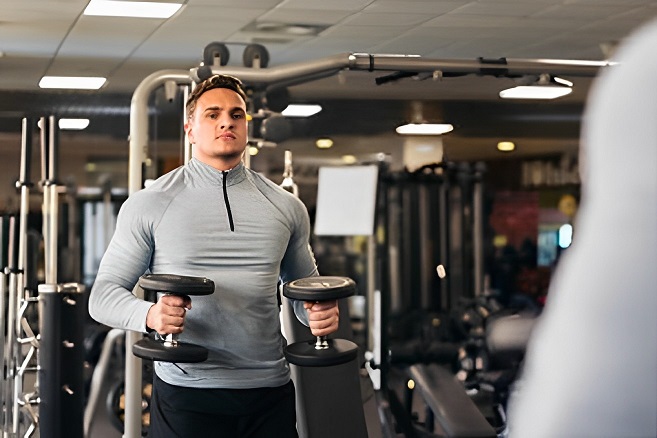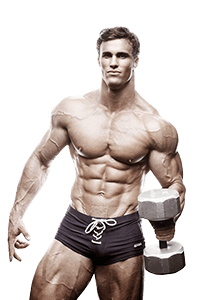Magnesium For Bodybuilding Explained
Magnesium For Bodybuilding Explained

Our body requires enough vitamins and minerals such as magnesium every day to stay healthy and fit. Unfortunately, many of us have low magnesium levels. In this guide on Magnesium for bodybuilding explained, we will read about magnesium and its benefits for overall growth and development.
Magnesium deficiency is generally linked to insomnia, headaches, constipation, and low bone mineral density. Despite the fact that a large number of processed foods and supplements are enriched with magnesium, many people still don't take in enough dietary magnesium every day.
Let us have a close look at some amazing benefits of magnesium.
Improves sleep
The sleep of at least 8-9 hours every day is important for overall growth and development. This is simply because our body grows and recovers as we sleep. The daily intake of vitamins and minerals has a profound effect on how well and long we sleep. For instance, magnesium binds to GABA, a neurotransmitter, and magnesium deficiency can lead to trouble falling asleep, a lack of quality sleep, or both. Better sleep translates to better recovery and better muscle growth.
Several studies have suggested that not getting enough magnesium every day can result in many psychological and behavioral changes such as stress, anxiety, and depression, all of which can severely impact your sleep in the short as well as the long term.
Better Electrolyte Balance
Magnesium and calcium play critical roles in controlling muscle activity. While magnesium assists with relaxation, calcium assists with contraction. Unbalanced magnesium and calcium levels can lead to muscle spasms or cramps. Conversely, sodium and potassium play an important role in muscle contraction and this is the primary reason why athletes, heavy lifters, and fitness enthusiasts should be aware of electrolytes (such as sodium and potassium) when they engage themselves in intense gym sessions, cardio sessions, or strength training sessions. A lack of sodium and potassium in your daily diet can negatively impact your athletic and gym performance.
Therefore, it does make sense for you to add more magnesium to your daily diet. By itself, potassium cannot cross the cell membrane and magnesium should be sufficiently present in the body for potassium to enter the cells in your body. In the absence of magnesium, your body just cannot use and absorb potassium.
Low magnesium levels can put you at an increased risk for potassium deficiency which can translate to cramps, fatigue, and weakness. You can increase the level of magnesium in your daily diet through supplements and/or foods to prevent electrolyte imbalances and elevate your gym performance.
Strengthen Your Bones
An essential mineral for building strong and healthier bones, magnesium is as important as calcium and vitamin D for strengthening your bones.
Vitamin D and magnesium have the ability to profoundly increase the uptake and delivery of calcium in the body that is required to build strong teeth and bones. This is the primary reason why vitamin D and magnesium are vital for bone health.
In the human body, magnesium is involved in the synthesis of proteins, fats, and nucleic acids, cardiac activity, bone metabolism, and neurological activity. When it comes to bodybuilding, it plays a pivotal role in both aerobic and anaerobic energy production, especially in the metabolism of adenosine triphosphate (ATP), which is referred to as the "energy currency" of the body. ATP synthesis requires magnesium-dependent enzymes known as 'ATPases' that have to work really hard. It is important to note here that the average human can store only 3oz of ATP but the rate of ATP turnover during intense workouts is next to phenomenal with as much as 15kg of ATP per hour getting broken down and reformed (from adenosine phosphate and diphosphate).
The primary sources of magnesium through foods include black beans, green vegetables (such as spinach and kale), seeds and nuts (such as almonds and pumpkin seeds). You can also find magnesium well supplied in unrefined whole grain cereals, such as whole meal bread and in peas, bananas, baked potato, broccoli, Yoghurt (low-fat, plain), and lentils. Contrary to common belief, dairy products such as milk are not rich sources of magnesium. You can add a leafy green salad to your breakfast or lunch, munch on almonds and seeds for a snack, or add beans to your favorite side dish.
The recommended daily intake of magnesium is 310-420mg every day for adult men and women. In elder people with magnesium deficiency, the recommended dose may go up to 500mg every day. Ideally, magnesium is best taken in small and frequent doses of 100mg three times a day instead of 300mg in a single go. It is important to remember that magnesium is effective and safe when consumed under the supervision of a healthcare practitioner. However, magnesium may interact with certain medications like muscle relaxers, bisphosphonates, antibiotics, and blood pressure medications. Abuse or overdosing on magnesium supplements can lead to magnesium side effects such as stomach cramping, gastrointestinal pain, or diarrhea.
The deficiency of magnesium can lead to severe and debilitating health conditions such as altered cardiovascular function, including electrocardiographic abnormalities, impaired carbohydrate metabolism with insulin resistance and decreased insulin secretion, and high blood pressure. Magnesium deficiencies and imbalances can cause neuromuscular disorders, kidney diseases, asthma, coronary heart disease, premenstrual syndrome, pre-eclampsia and eclampsia, and even obesity. The possible symptoms of sub-optimal magnesium intake include frequent mood swings, depression, lethargy, irritability, muscle cramps, tremors, and twitches. It can also lead to pre-menstrual bloating and restless legs at night.
We hope that this guide on magnesium for bodybuilding explained have helped you gain a clear and complete understanding of the innumerable benefits of magnesium.
Recommended product - VPLab Ultra Men's Sport






